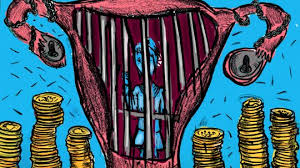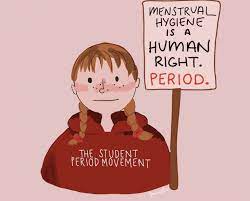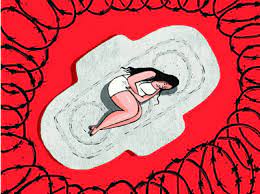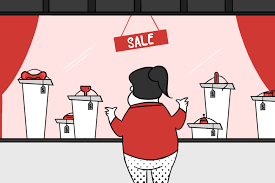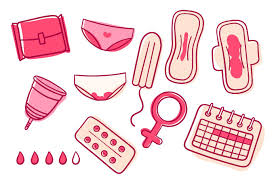Period Poverty: Everything you need to know!
4 minuteRead

Menstruation poverty is defined as a lack of access to menstrual products, cleanliness, and adequate education. An estimated 500 million individuals are affected by this global problem. Those who are living in poverty for an extended period of time may face mental health issues as well as physical health hazards. Period poverty is mostly caused by a lack of money. Period products quickly go to the bottom of the priority list if you only have enough money to choose between food and health.
By Samyati Mohanty
All around the world, menstruating women and young girls are excluded from basic activities such as eating specific foods or socializing. Menstruation is associated with cultural shame, and women are unable to attend school or work every day due to a lack of resources. Lack of access to sanitary goods, menstrual hygiene education, bathrooms, handwashing facilities, and/or waste disposal is classified as period poverty.
A few states in the United States have implemented laws requiring schools to give children period products, believing them as important as toilet paper, but more effort has to be done. In federal prisons, menstrual products were only made available for free in 2018. A petition and march have been established by activists to push the Department of Education to eradicate period poverty in the United States. They urged that the government recognise period products as medical necessities, support regulations that protect menstruation kids, and subsidize period products in school restrooms.
"Meeting all teenage girls' hygienic requirements is a critical issue of human rights, dignity, and public health," UNICEF added.
Inadequate menstruation hygiene is not a problem exclusive to Indian women. It affects people in both the developed and developing worlds, with women in poverty being particularly vulnerable.
Everything you need to know about this major human rights issue is right here.
Who is affected?
Menstrual health is a problem that affects both men and women. According to UNICEF, 2.3 billion people worldwide lack basic sanitation services, and just 27% of individuals in poor countries have adequate hand washing facilities at home. The inability to utilize these facilities makes it more difficult for women and young girls to manage their periods in a safe and dignified manner.
Special needs and disabled girls are disproportionately denied of the facilities and resources required for proper menstrual hygiene. When women and girls live in conflict-affected areas or in the aftermath of natural disasters, it is more difficult for them to control their periods.
Menstrual hygiene education is also beneficial to young guys. Girls and boys are taught about menstruation at a young age at home and at school, which encourages good habits and removes the stigma associated with the natural process.Menstruation equity means having access to sanitary supplies for people all throughout the world. decent restrooms, hand washing facilities, sanitation and hygiene education, and waste management.
What are the main causes?
Menstruation is frowned upon all throughout the world. In Nepal, for example, menstruating women are deemed impure and are confined to shelters during their periods. Despite the fact that menstruation huts are technically illegal, families continue to put their lives in danger because myths and misconceptions are deeply ingrained in culture .According to a study conducted by an Indian non-governmental organization, many girls skip school while they are on their period to avoid being teased by their peers. It is a basic problem of human rights, dignity, and public health to meet the hygiene needs of all adolescent females. Many girls and women also lack the financial means to purchase menstrual products.
The tampon tax, included under the "pink tax,", just like every other product used by women, is named from the significant usage of the color pink in marketing women centric products. Despite the fact that some governments have lifted the tax on period products as luxury commodities, others continue to use it as a form of gender discrimination. Ending the tax globally will not make period products accessible on its own; far too many people cannot afford them and are frequently forced to choose between food and menstruation supplies.
According to the United Nations International Children's Emergency Fund, many Bangladeshi families cannot afford menstrual supplies and rely on old garments (UNICEF). According to the Indian Ministry of Health, just 12% of menstruators in India have access to sanitary items, leaving the remainder to rely on dangerous materials like rags and sawdust as an alternative.
Why is it a problem?
Poor menstrual hygiene, according to UNICEF, can cause physical health concerns and has been linked to reproductive and urinary tract infections. It also prevents women from attaining their full potential by denying them vital opportunities for development. Young girls who do not acquire an education are more likely to marry as children, which can lead to early pregnancy, malnutrition, domestic violence, and pregnancy difficulties. Period shame has a bad impact on one's mental health. It dehumanizes women by making them feel ashamed of a natural bodily process.
Women still hide their period products from men and teach young girls to do the same. Menstruators, on the other hand, should be proud of and confident in their abilities to succeed in their society.
How can we stop it?
The first step is to de-stigmatize menstruation and remove the stigma surrounding this natural phenomenon. Then policies to ensure that menstruation products, sanitation, and hygiene are widely available must be established. Activists and campaigners are urging governments to prioritize menstrual equity policies, although the topic has been a barrier in the past.
MINA Foundation, for example, does not wait for the government to act; instead, it provides young women with menstrual products to assist them continue in school.
The World Sanitation and Hygiene Conference aims to improve sanitation and hygiene for the world's most disadvantaged people. With programmes such as arranging menstrual waste seminars in West and Central Africa and pushing for menstrual waste-friendly toilet designs in India, the organization attempts to eliminate the stigma surrounding menstruation and alter national policy through education and behavior modification.
"It's easy," WASH United's head of human rights Hannah Neumeyer explained, "women and girls have human rights and periods". Also added, "Neither of you should be able to defeat the other."
Write, Record and Answer! Consume Unlimited Content! All you need to do is sign in and its absolutely free!
Continue with one click!!By signing up, you agree to our Terms and Conditions and Privacy Policy.




